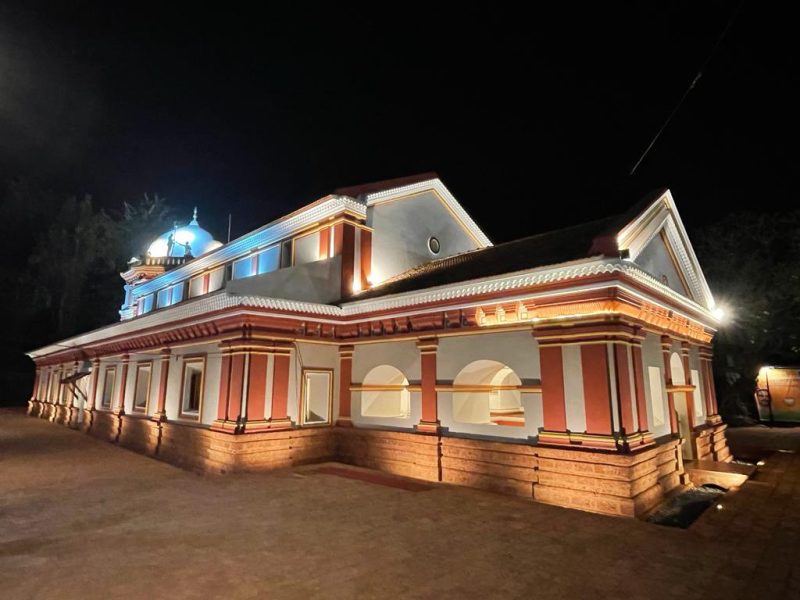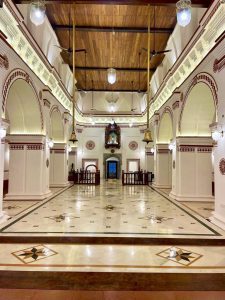Goa's 350-yr-old Shri Saptakoteshwar Temple restored: All you need to know

Prime Minister Narendra Modi and Union Home Minister Amit Shah have congratulated the Goa government on the renovation of the historic Shri Saptakoteshwar Temple and said it will deepen the youths’ connect with spiritual traditions and boost tourism in the state.
Chief Minister Pramod Sawant on Saturday (February 11) inaugurated the refurbished temple, which was constructed by warrior king Chhatrapati Shivaji Maharaj more than three centuries ago at Narve village in North Goa district, 30 km from Goa’s capital Panaji.
The Goa state Archives and Archaeology Department has refurbished the temple.
Also read: Restore Goa churches abandoned during Portuguese rule: BJP
Shri Saptakoteshwar temple is a protected site of Goa government’s Department of Archaeology.
Restoration work began in 2019
According to the state government, the restoration work of the temple was taken up in 2019.

“This temple is a landmark heritage conservation project by the Department of Archaeology. This temple is an important historical landmark which was undertaken for restoration in the year 2019 and marks the completion of 350 years of the Temple Jeernodhar by Chhatrapati Shivaji Maharaj,” the government said.
“The historicity of the temple is not only confined to the singular structure but also lies in the surrounding peripheral remains and antiquities. A row of ruinous Laterite arcades, the Tali on the North-East side, Tulsi Vrundavan and Deepstambh in the front open space of the temple along with many other known-unknown elements are very much part of the intrinsic value of the site as a whole. The restoration works were executed in a systematic way with the implementation of conservation best practices to reinstate the heritage character of the temple,” it added.
Chief Minister @DrPramodPSawant inaugurated the restored Shree Saptakoteshwar temple by lightning traditional lamp in a religious and enthusiastic atmosphere at Narvem, Bicholim today. 1/3 pic.twitter.com/pdORBLKDU5
— DIP Goa (@dip_goa) February 11, 2023
Shri Saptakoteshwar is ‘Raj Daivat’ of Goa
In a series of tweets, CM Sawant said, that the temple would be dedicated to the people after performance of due religious rituals and in the presence of descendants of Chhatrapati Shivaji Maharaj.
Also read: How Ganesha temple built by Indian immigrants came up in Flushing, New York
“Shri Saptakoteshwar is the ‘Raj Daivat’ of Goa. The history of temple, originally situated at Naroa, Diwar, Tiswadi, goes back to Kadamba Dynasty rule. It was desecrated by Bahamani rulers, rebuilt during Vijayanagara rule. It was again destructed by Portuguese rule in 1540.
“Fearing the destruction, the temple was shifted to Narve, Bicholim, at present location. The Present temple was built by Chhatrapati Shivaji Maharaj in 1668. His successful campaigns put a check on Portuguese brutalities and religious conversions in Goa.
“The renovation of the temple is done under Goa Archives and Archaeology department. During the renovation the ‘Kaavi’ art form of wall decoration is being executed, to revive the art,” Sawant said.
Jal Abhishek at Shree Saptakoteshwar Temple, Narvem https://t.co/IevmCmlOhe
— Dr. Pramod Sawant (@DrPramodPSawant) February 11, 2023
Sawant also said that the Goa government is committed to build the temple at the original site at Diwar Island, “as the symbol of Goa’s fight against religious persecution during Portuguese rule”.
Legend behind name Saptakoteshwar
As per Goa tourism’s website, the legend behind the name Saptakoteshwar is quite interesting. According to the legend, seven holy sages once set out to pray to Lord Shiva near the place where five holy rivers met the sea. They prayed for seven crore years at the end of which, Lord Shiva appeared to grant their wishes and agreed to stay at the place in one of his incarnations. This incarnation is known as Saptakoteshwar (sapt means seven and koteshwar means lord of crores).
The most important festival celebrated at the temple, attended by thousands of devotees from Goa and other parts of India, is Gokulashtami in September which is considered to be the day on which Lord Shiva appeared in this incarnation to grant the wishes of the seven holy sages, it added.
Modi’s tweet on temple
PM Modi in a tweet on Saturday said, “The renovated Shree Saptakoteshwar Devasthan, Narve, Bicholim will deepen the connect of our youth with our spiritual traditions. It will also further boost tourism in Goa.”
The renovated Shree Saptakoteshwar Devasthan, Narve, Bicholim will deepen the connect of our youth with our spiritual traditions. It will also further boost tourism in Goa. https://t.co/b32tNzz9BB
— Narendra Modi (@narendramodi) February 11, 2023
Union minister Shah also congratulated the Goa government on the reopening of the historic temple after renovation.
“After being attacked by multiple invaders, Chhatrapati Shivaji Maharaj rebuilt the temple. As a major pilgrimage site, it will draw tourists from all over India, he said.
Congratulations to the Goa government on the reopening of the historic Shree Saptakoteshwar Temple after renovation.
After being attacked by multiple invaders, Chhatrapati Shivaji Maharaj rebuilt the temple. As a major pilgrimage site, it will draw tourists from all over India. https://t.co/XX61MKPGqI
— Amit Shah (@AmitShah) February 11, 2023
Responding to PM Modi’s post, Sawant tweeted, “With your continued support Hon’ble PM @narendramodi ji, in this #AmritKaal Goa is working towards promoting and developing cultural and spiritual sites to further boost the tourism in the state.”
Blessed to perform the Jalabhishek at Shri Saptakoteshwar Temple with the holy water from auspicious places in Goa & Maharashtra.
The temple of Shri Saptakoteshwar, on restoration will be dedicated to people today. pic.twitter.com/gprwUOyAya
— Dr. Pramod Sawant (@DrPramodPSawant) February 11, 2023
